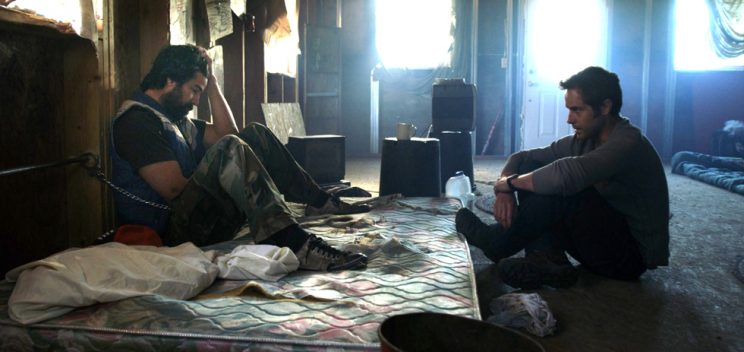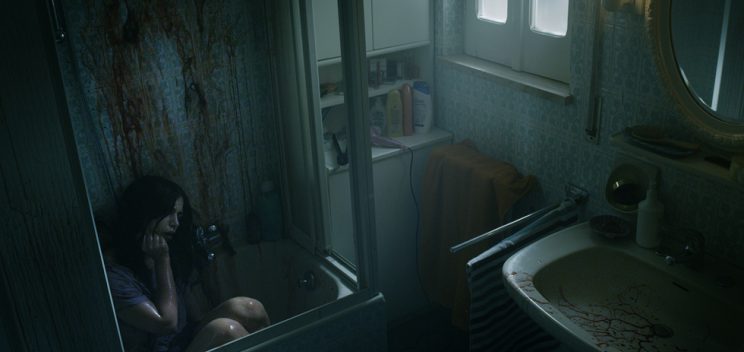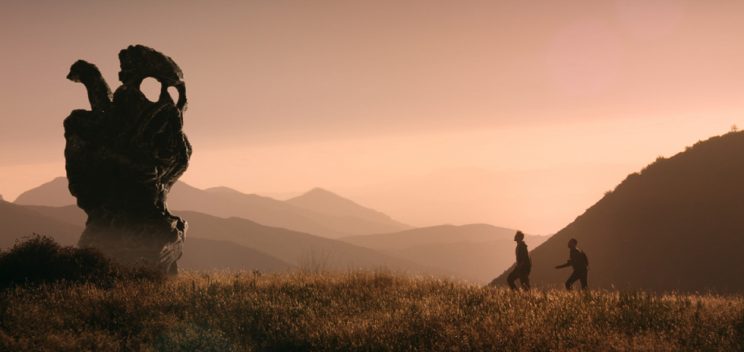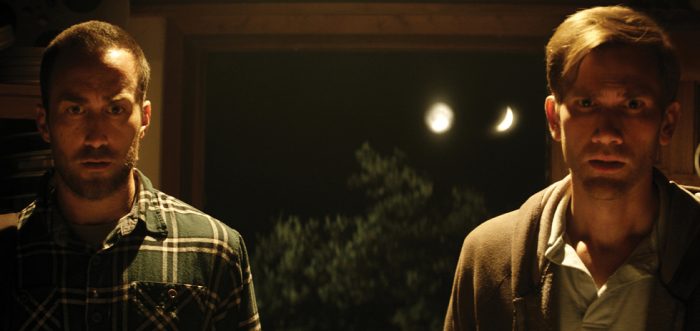The first enigma of Shitty Carl lies within his name. Is this emphatic shittiness linked to his moral failures as a human being, his inescapable status as a cad, a brute, a stinker, a lout? Or is the eponymous shittiness of this character whose presence permeates the films of Justin Benson and Aaron Moorhead in Resolution (2011), Spring (2014) and The Endless (2017) — both offscreen and, finally, on — linked more to his mood: is his temperament so irritable that it has earned him a moniker beyond cranky, cantankerous, pissed-off? I’m not the only one obsessed with Shitty Carl: as Aaron Moorhead noted in early 2017, “Shitty Carl is always in our projects, and in our hearts.”
The earliest reference to Shitty Carl in the Moorhead and Benson narrative universe is in their extraordinary feature debut as co-directors, Resolution. I first came across this film three days before I submitted the final manuscript to my publisher of my 2014 book Found Footage Horror Films: Fear and the Appearance of Reality. A friend dropped me an email and casually said: “This isn’t really found footage horror, but it is probably of interest to you seeing you are writing about found footage horror.” Not even beginning to imagine what this could possibly mean, I watched the film; it left me shocked, stunned and thrilled like a genre film had genuinely not left me for years. I frantically squeezed in a short reference to Resolution before I hit ‘send’ on the final book, something along the lines of it being “sophisticated”, evidence of what I now identify as a kind of “post-found footage horror film”.
As far as set-ups go it’s solid, but where Benson and Moorhead take it is somewhere altogether astounding. Comfortably middle-class Mike (Peter Cilella) leaves his pregnant wife in the city to stage a one-man intervention for his drug-fucked one-time best friend Chris (Vinny Curran), a junkie who lives in an isolated rural shack, spiralling into violence and madness. Vowing to his wife he will spend only one week away, Mike’s decision is prompted by a video Chris has sent of him (or which Mike thinks Chris has sent him) shooting invisible birds and shouting at the sky, well and truly off his chops. Mike researches the likely behaviours that will result from Chris’s withdrawal, and arrives prepared (stun-gun and all).

Resolution is where we first hear of Shitty Carl. We don’t see him, he never turns up and he’s never on camera, but he’s around. Shitty Carl is a rumour, an absent-presence, a meth-riddled ghost. As the haunted media through-line of Resolution unfolds, Chris tells Mike he couldn’t have sent him the original video that prompted the intervention as he sold his computer and camera to a guy called “Shitty Carl”. It’s a passing line, but in a flash a fan institution was born. Chris and Mike have more immediate problems, however, both worldly in the shape of violent fellow addicts Micah (Skyler Meacham) and Billy (Kurt David Anderson) and, it is soon revealed, an entity from an altogether different celestial plane. Throughout the film, Mike becomes increasingly enraptured with his discoveries of different types of discarded media — celluloid, photographs, VHS tapes, vinyl — and the film’s intensity grows. The footage on these tapes and films reveals to the men different variations of their own fates and that of others, soon followed by their witnessing of what appear to be actual future events. Finally acknowledging the presence of an invisible dominant presence who delights in fucking explicitly with the entire concept narrative closure, the film ends with Mike pleading for another shot of the story.
Despite the complexity of its narrative and the sophistication of its conceptual mechanics, Resolution is never smug, and opts for no tricks or self-satisfied sleights-of-hand. We are always aligned with our protagonists — for better or for worse; they can both at time be dicks — and this is a film always prepared to look its audience directly in the eye and speak frankly. At first, Resolution plays out almost like a stage production with its mostly single location and dialogue-driven drama, but as Mike begins investigating the area surrounding Chris’s house unusual things begin to happen. Aside from the central investigation concerning the mysterious media he finds, at one point he also bumps into two young, wide-eyed members from UFO death cult that live nearby, played by Moorhead and Benson using their own first names. But what seems in the context of Resolution at first to be cute directorial cameos, six years later becomes the narrative core of The Endless, where the story of the two brothers the directors play becomes the subject of their own movie.

“Can We Try It Another Way?”
The status of Resolution as a found-footage-film-but-not-really ties in neatly to The Endless, which is a sequel-to-Resolution-but-also-not-really. In between these two films was 2014’s Spring, which — while UFO death cults were thin on the ground — still found room for Shitty Carl. Again he doesn’t appear on screen, but his name is evoked in the first five minutes when he’s called in to cover a shift for the film’s protagonist after his mother’s funeral (his boss is played by Vinny Curran, Chris in both Resolution and The Endless). Shitty Carl may not play an exactly central role in Spring, but he is one of the few threads that ties it to the feature films that bookend it. Spring is very much its own beast; that strange, rare creature that is the Lovecraftian romance film. As a subgenre this may not exactly be tried-and-tested safe ground for genre filmmaking, but their gamble paid off — as demonstrated by a fan base including Guillermo Del Toro and Richard Linklater, the latter declaring “it’s a beautiful, unique love story. An accomplishment of genre and tone.” Del Toro articulated Spring’s strength perfectly, celebrating the fact that it was “wilfully unbound by genre”, as eloquent and succinct a phrase as any that also applies just as easily to Moorhead and Benson’s broader filmography.
Spring is, first and foremost, a love story, and a beautiful and intelligent one at that. The film opens in a moment of heart-wrenching intimacy as the film’s protagonist Evan (Lou Taylor Pucci) watches his mother die of cancer, and after losing his job and prompting the violent ire of a local thug, hot-foots it to Italy for a random, unplanned holiday to get his shit together. In a small coastal town in southern Italy he is drawn to the sexually confident Louise (Nadia Hilker), whose mixed signals he at first has trouble deciphering. After some false starts, what begins as casual holiday fuckbuddies develops into a deeper relationship, until it is revealed that Louise’s unusual behaviour (and unsightly random skin condition) is the result of her evolutionary and cyclic return to the state of a tentacled 2000-year-old Lovecraftian she-monster that evolves and devolves back and forth into human woman form. Despite Louise’s strong recommendations to do otherwise, Evan decides to stick it out and to see if there’s even the slightest possibility that Louise has been so physiologically altered by the biochemical effect of love that she can become permanently mortal.
In the hands of virtually any other director the plot of Spring would be difficult to not collapse into slapstick, and yet between them Moorhead and Benson pull it off with an intense, believable sincerity. This is not merely a result of their superpowers as directors: Aaron Moorhead is a strong cinematographer in his own right, and while the stylistic rawness of the low-budget Resolution shrewdly fed into the very narrative of the film itself, in both Spring and The Endless Moorhead’s skills behind the camera are fully realised. As the title indicates, Spring is fixated on the natural environment and its in-built tendency for change and rebirth, and Moorhead’s cinematography revels in Spring’s smaller details — flowers, lizards, etc. — as much as it does on the more spectacular scenes of Louise’s devolution. Likewise, as screenwriter of Resolution, Spring and The Endless, Benson’s intuitive knack for capturing naturalistic dialogue in scenarios that are far from natural is the engagement machine that propels these films. Even more than Resolution and The Endless, it is fair to say that Spring — with its fantastic, on paper even absurd premise — would not come off as even remotely convincing if it wasn’t for how firmly grounded Benson’s dialogue is in the nuance and minutia of everyday interactions.
But script and cinematography can only do so much, and it’s its directors — and the strong cast they choose to work with — that ultimately grants Spring its potency. As Evan, Pucci is the perfect vessel through which we read the events in Italy that form the basis of the film, combining a subtle sense of bewilderment (at times perhaps even naivety) with the kind of sad, sluggish desperation all too familiar with the loss of a loved one. With this, however, is an unspoken faith and determination, often articulated in a look or a gesture as much as any one particular line of dialogue or narrative action. But even more importantly is Hilker herself, who plays Louise with an intelligence and compassion that makes superficial attempts to write her off as the same-old monstrous feminine bullshit effectively impossible. What moved me so deeply about Louise was how she fully accepted her own monstrosity as simply part of who she was, but never wholly who she was. She never saw herself as a tentacled 2000-year-old Lovecraftian she-monster, just a girl who could sometimes be a tentacled 2000-year-old Lovecraftian she-monster. It might sound flippant, but every 28 days I think of Louise and remember that it’s okay, this is not who I am all the time, just who I am sometimes. Spring takes the conventional wisdom that love is just a biochemical reaction between two human beings and turns that into possibly the best body-horror-love-story ever made. Resolution and The Endless might deal with different kinds of love — between friends in the former, and between brothers in the latter — but at their core they too are about the centrality of connection, intimacy and affection. And, of course, the fact that no matter how hard we try, we just can’t shake Shitty Carl.

“I Think They Were Looking for Monsters and They Found Each Other”
Like Spring, The Endless holds symbols and cycles at its core but — again — in a way wholly lacking pretence and smug winks to camera. The film picks up 10 years after Justin and Aaron (the characters, again played by the directors) have left Camp Arcadia and the cult that were effectively their family when they were left orphans after a fatal car accident. The Endless begins in what is hardly new terrain, as cult survivors are shown trying to live a ‘normal’ life. But even from the outset what is striking is just how this seemingly noble attempt has failed. Justin and Aaron are poor, lonely and socially isolated, an angry control freak in the case of the former, and a sad, fed-up manchild in the case of the latter. With little argument to counter Aaron’s frank assessment of their miserable post-cult adulthood, Justin agrees to a brief return visit to the camp after — like Resolution — the arrival of a mysterious video cassette from happy (virtually euphoric) cult member Anna (Callie Hernandez). As they approach the camp, actor James Jordan is seen stomping with furious determination past them in the opposite direction, playing a character later revealed to be… none other than Shitty Carl. Justin bumps into him a few times while jogging during his time at the camp, met with the same response: he is ignored, and Shitty Carl storms on.
It takes some time for his identity to be revealed, but as Justin and Aaron increasingly pay witness to strange yet compelling natural phenomena back at the camp, it is finally Shitty Carl who articulates most concisely what is going on with the strange narrative-obsessed presence in the sky who keeps rebooting the lives of the humans in its domain like a four-year-old playing with dolls. They are trapped, as he words it in his signature parlance, in a “bunch of looping prisons, man. Like shitty pods of time, repeating over and over and over again like rats telling stories for that things amusement.” His loop, he says, is 10 minutes in duration, at the end of which he is killed and has to start his ‘story’ again. Some inhabitants have longer loops and others (as seen in the case of a man from the early 1900s in one of the film’s most memorable sequences) are agonisingly short. Having not yet come to the end of his first ‘loop’, Justin — lost and wandering through the affected terrain after a confrontation with Aaron and the cult’s informal leader Hal (Tate Ellington) — searches for his way back to his brother to escape before they too become trapped in the same eternally doomed narrative cycle.
On one level, it’s hard not to read into The Endless and its central, enigmatic presence a reflexive meditation on our status as spectators: gluttonous, demanding consumers with panoptic vision, our unthinking and ceaseless hunger for screen media rendered monstrous. But in a way, there’s just too much heart, too much feeling, too much sadness and too much desperation in the manner with which the experiences of the film’s ‘captives’ are rendered for such a purely clinical reading. When Justin arrives at the scene of Resolution’s action, there is for those of us familiar with that earlier film and who have picked up the clues littered along the way a sense of tragic inevitability: we’re caught in a loop, too. What is ultimately so impressive about The Endless, however, is how little the concrete, explicit connections to Resolution ultimately mean. The Endless has received extraordinarily positive critical and audience reception, largely by those who make no or little reference to the earlier film: if you’ve seen Resolution there’s the thrill of return, sure, but if you haven’t, the whole concept of the film renders it unimportant either way. Stories loop — endlessly — whether we are aware of them all or not.
The films of Justin Benson and Aaron Moorhead make me want to rip out my orthodox film critic voicebox and find new ways of speaking about the experience of watching great cinema. Every frame is a demand to acknowledge the supremacy of poetry and humanity over intellect and bravado. These movies provoke me in a way that determinedly rejects critical posturing, the professional instinct to take a movie apart like an old watch and put it back together again, stripped of the mysteries of time and beauty. Justin once said on Twitter that “scholarly film theory analyses of @resolutionstory make me feel dumber than when I look down to find my iPhone sitting in my whiskey,” and I think of this often when the eternal undergraduate in me resists the temptation to resort to theoretical crutches like Jean Baudrillard and Jean-François Lyotard as ways of getting a handle on their work. For me at least, these films are post-theory, post-criticism, and — in their conscious, playful experimentation with and around the entire concept of ‘genre film’ — in many ways beyond categorisation. But more essentially, they also hearken back to something fundamentally elemental and (in Spring most explicitly, but also in the presence that looms over Resolution and The Endless) primal. These three films talk about moving ahead by tracing our steps backwards, and how Benson and Moorhead manage to do this with such sincerity, eloquence and artistry is a puzzle I never wish to decipher.
